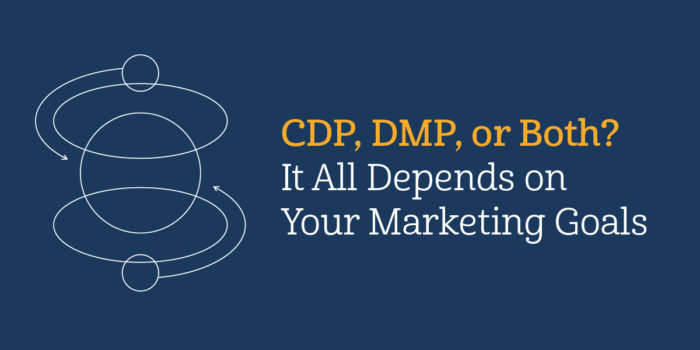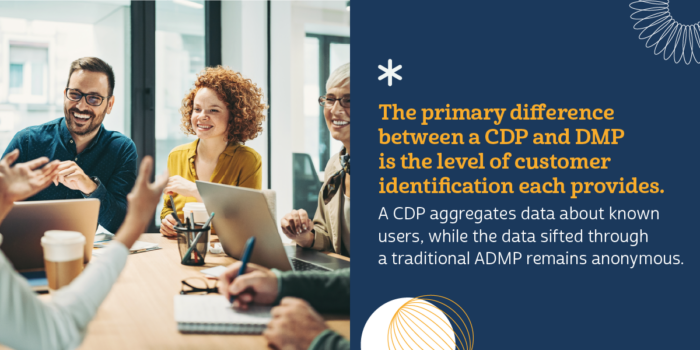
You wouldn’t use a screwdriver to pound in a nail, would you? Nor would you try to loosen a screw with a hammer. And yet many brands do something similar by attempting to use either a customer data platform or a data management platform for an unintended purpose.
Moreover, just as hammers and screwdrivers come in various sizes, styles and quality levels, so do today’s sophisticated analytics platforms. Throw in some ambiguous, if not misleading, marketing claims, and it’s no wonder there’s so much confusion.
As businesses continue investing in digital marketing and advertising, effective data management solutions have become more crucial than ever. But with so many options, how do you choose the best one for your business? Let’s learn the differences between a data management platform and a customer data platform and explore their unique features and use cases.
What Are CDPs?
CDPs are a data management platform designed to collect, unify and manage customer data from multiple sources. For example, a CDP allows businesses to create a unified profile of each customer by combining data from online and offline sources, including website interactions, email interactions, purchase history and customer service interactions.
CDPs provide a single source of truth for customer data, enabling businesses to gain a holistic view of each customer and personalize their marketing campaigns based on individual preferences, behaviors and needs. CDPs also allow companies to track customer journeys across multiple touchpoints, providing insights into the most effective marketing channels and touchpoints for engaging customers.
CDPs typically provide a user-friendly interface for accessing and analyzing customer data. They also usually offer a range of advanced features such as predictive analytics, real-time segmentation and machine learning capabilities.
What Are DMPs?
DMPs are another data management platform designed to collect, organize and activate large sets of anonymous data. Unlike CDPs, which focus on customer data, DMPs manage and analyze data from multiple sources, including first-party, second-party and third-party data.
DMPs allow businesses to collect and analyze anonymous data from various sources, such as web analytics, ad impressions and social media interactions. By organizing this data into segments based on shared characteristics, such as demographics, interests or behaviors, DMPs enable businesses to create more targeted and effective marketing campaigns to win over prospects.
One of the critical features of DMPs is their ability to integrate with various marketing and advertising platforms, such as demand-side and supply side platforms. By integrating with these platforms, DMPs enable businesses to use their audience segments to target specific ads to specific users across multiple channels.
Differences Between CDP vs. DMP

The primary difference between a CDP and DMP is the level of customer identification each provides. A CDP aggregates data about known users, while the data sifted through a traditional DMP remains anonymous. The first group generally comprises existing customers who already use your product or service or have at least requested collateral. In contrast, the second includes tire kickers in the “just looking” phase.
Another crucial difference between a CDP and DMP is their data personalization level. CDPs enable businesses to personalize their marketing campaigns based on unique customer preferences, behaviors and needs. At the same time, DMPs would allow companies to tailor their advertising campaigns based on shared audience characteristics.
The implications from a marketing perspective are immediately apparent. Do you have a new product offering in your loyal customers’ wheelhouse? Are you trying to reach new customers for your existing product line? Or, are you looking for a prospecting and personalization engine to accomplish both?
The answer will drive your decision about which tool to use. One requires the marketing equivalent of a hammer. To do the other job right, you need a marketing screwdriver.
That’s the high-level differentiation between CDPs and DMPs. There are more nuanced differences, not just between the two primary categories but also within each category.
Second-Level Sorting —Traditional DMPs
In terms of business cases, traditional DMPs often focus on the type of business they serve, which fall into two primary groups.
- Publishers: This category includes any business that owns and manages digital media properties. Publishers use DMPs to package their inventory into marketable audiences and sell them directly or programmatically. They also use the analytics that DMPs offer for campaign planning, audience optimization and sales enablement by validating the presence of desirable targets consuming their content.
- Marketers and agencies: Marketers and agencies use DMPs to learn more about their existing customers — beyond what product they are buying — and to define new persona targets and content categories. They also leverage data marketplaces available within DMPs to refine and scale their first-party data to improve campaign performance and increase customer acquisition.
In addition to those fundamental differences, cloud-based companies now own many DMPs — some of which push CDP services over DMP. There are also “DMP lite” capabilities built into walled gardens for “free,” but they pose limited value beyond retargeting and generic cohorts grouping — unless you want to invest heavily in the rest of the walled garden to make the tech “affordable.” So, caveat emptor. If you’d like a more detailed look at different types of DMPs, G2 has a good summary.
Second-Level Sorting — CDPs
The Customer Data Platform Institute lists four distinct types of CDPs.
- Data CDPs: This type focuses on collecting, storing and managing customer data. They allow companies to unify customer data from various sources and make it available in other systems.
- Analytics CDPs: These CDPs help companies analyze customer data and gain insights that can improve business performance. They offer various analytics tools to generate reports and visualizations that help businesses better understand their customers.
- Campaign CDPs: Campaign CDPs focus on creating and executing targeted marketing campaigns. They allow businesses to segment their customer base and deliver personalized messaging across various channels, including email, social media and mobile.
- Delivery CDPs: With this type, businesses can deliver personalized experiences across different touchpoints, including web, mobile and email. They offer a range of tools to personalize content and optimize customer journeys.
Getting the Right Information From These Platforms
Getting the correct information from a DMP and CDP depends on your business’s specific needs and the data you need to manage.
CDPs provide a complete view of each customer, enabling businesses to personalize their marketing campaigns based on individual customer preferences. CDPs can provide businesses with information such as customer profiles, purchase history, website interactions and social media activity. This information is essential for companies looking to improve customer engagement and build stronger customer relationships.
On the other hand, DMPs provide businesses with anonymous data that can create more effective advertising campaigns. DMPs can include information such as audience segments, ad impressions, click-through and conversion rates. These details are essential for companies looking to improve their advertising effectiveness and reach a wider audience.
While CDPs and DMPs serve different functions, they can be used together to provide a more comprehensive view of customer behavior, preferences, and needs. Together, they can provide marketers a more complete view of their customers, including their behavior across different channels and platforms. This can help organizations create more effective and personalized marketing campaigns that resonate with their target audience.
To Get the Right Answers, Ask the Right Questions
By now, finding the ideal analytics platform to achieve your marketing goals requires more than an off-the-rack purchase. You also need good customer support — experts who will tailor a solution that meets your needs, not try to sell you — or upsell you — something you will never use.
As you compare platforms and interact with sales teams, ask yourself if the proposed solutions meet these needs:
- Does it centralize all your data for a holistic view of your customers?
- Does it use the latest offerings in machine learning, lookalike modeling and other innovations to help you reach beyond your existing customer base through advanced prospecting?
- Does it work within today’s “cookieless” world?
- Does it comply with the latest auditable privacy management tools?
Lotame Can Help You Make Data-Driven Decisions
Understanding the differences between CDP and DMP is crucial for businesses looking to make data-driven decisions. While these platforms serve different purposes, they are essential tools for companies looking to improve their marketing and advertising effectiveness.
As a brand manager, you understand personalization is paramount when interacting with customers, whether they’re hardcore loyalists or potential prospects. That standard also applies to the tools that you use. You need data that will tell you who your customers are today and where you will find new customers tomorrow. It starts with a platform that tears down silos between marketing and advertising and enables unified data sets.
Brands collect data differently, so no two companies face identical obstacles. For some, data collection itself is the primary challenge. For others, the secret is to figure out how to use their trove of data for analytics and prospecting.
There’s an old saying that every problem looks like a nail to someone whose only tool is a hammer. So unless your marketing challenges are nothing but “nails,” don’t let someone sell you a hammer. You need a versatile toolbox that includes the best suite of options CDPs and DMPs offer.
Contact us today to learn more about how Spherical, Lotame’s end-to-end data collaboration platform, helps marketers and media owners drive growth and revenue with actionable customer intelligence, data-informed audiences and identity-powered activation.
Data & Customer Solutions Expert Alexandra Theriault is GM of Spherical at Lotame.